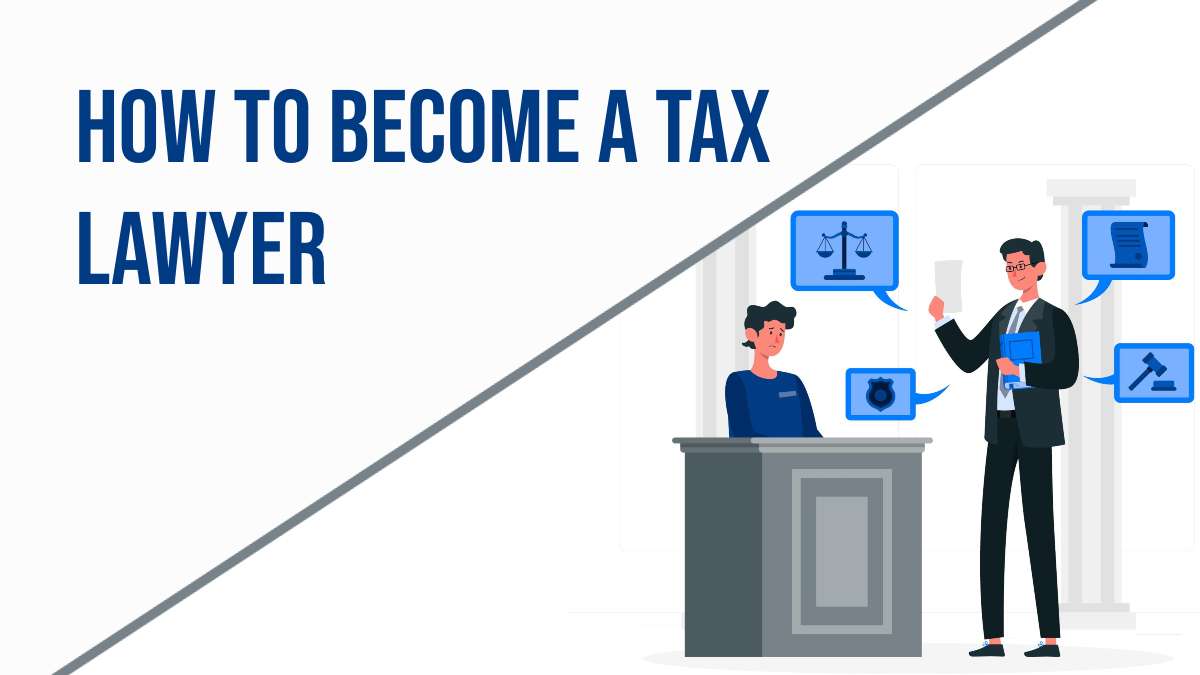
Consider becoming a tax lawyer if you want to mix money and law in your profession. Those in this position have a thorough understanding of tax law and assist their clients in resolving tax-related legal challenges.
If you want to pursue this job, you must put in years of study and training. We’ll get a vivid look at all you need to know about becoming a tax lawyer.
Also, you can able to know,
What Is a Tax Lawyer?
A tax lawyer is a lawyer who specializes in the field of taxation. They assist customers in determining how to address their specific tax circumstances.
In addition to defending you in court, a tax lawyer can assist people and companies in making better tax choices that can help them avoid tax problems.
They may also advise customers on maximizing their tax advantages by taking advantage of exemptions, credits, and deductions. Law firms or corporate legal departments often employ these legal specialists.
What Does a Tax Lawyer Do?
As we all know, tax law is one of the most complex legal fields. Each country has its taxes system, with complicated rules, regulations, and exclusions.
A tax lawyer must be skilled with statistics, adept at applying tough laws to sometimes more complex circumstances, and knowledgeable about the legal implications of various activities.
To become a tax lawyer, one must develop these abilities throughout law school and maybe graduation tax law practice. A tax lawyer is responsible for the following tasks:
# In court situations involving tax-related legal challenges, they represent their client.
# Tax laws are researched to provide the finest legal counsel to their customers.
# Some of the customers ‘ legal challenges are back taxes, property liens, account levies, unfiled returns, and wage garnishment.
# On behalf of their clients, they negotiate tax-related settlements with the IRS.
# Examine the seller’s debts, obligations, finances, and assets to advise how to organize the acquisition and sale.
# Create legal documents, including contract clauses, LLC agreements, and IRS letters.
# Assist clients with estate preparation by providing information on wills and trusts.
How to Become a Tax Lawyer in 6 Steps
Tax lawyers help clients with state and federal tax difficulties. They may advise people or companies on correctly filing taxes, mainly when dealing with complicated rules or huge sums of money.
Rules and regulations differ by state, so tax lawyers must be conversant with them to keep their clients from IRS problems. Now let’s see how to become a tax lawyer.
Earn a bachelor’s degree
A bachelor’s degree is required before enrolling in law school. While majoring in a related field of study may not be required by law schools. It may be the best idea to prepare for a career in tax law by doing so.
Consider political science, finance, or accounting as a field of study. While selecting college courses, look for tax laws, tax regulations, and accounting courses.
Prepare for law school.
You may start preparing for law school throughout your undergraduate studies. By expanding your CV throughout college, you can demonstrate that you are a well-rounded candidate for law schools.
Joining legal-related student clubs or interning at law firms are two options. There may even be volunteer activities to help you get into law school. You may also start preparing for the Law School Admissions Test (LSAT) throughout your undergraduate years (LSAT).
Consider taking an LSAT prep course or going through an LSAT study guide. You may also wish to investigate whether a practice exam is available to help you prepare for the real thing.
Take the LSAT
Getting a high LSAT score might increase your chances of being accepted to law school. This exam assesses your ability to reason analytically, read critically, and think critically.
This exam is made up of a sequence of difficult multiple-choice questions. The LSAT is often taken in the summer of junior year or the autumn of senior year. It’s critical to allow enough time for your exam results to arrive to submit them with your law school application.
Attend law school
A tax attorney must possess a Juris Doctor (J.D.) from an approved law school. In general, three years is the norm. Significantly, the first year of law school covers fundamental legal topics.
Elective courses, internships, and clinical begin in your second and third years. According to your curriculum, you may focus on tax law, essential for tax attorneys.
To prepare for this job, look for a law school that offers a J.D./LLM in Taxation. Although lengthier than standard law school programs, these programs may help you get a deeper understanding of tax law.
After law school, you may pursue an LLM. Some of these schools may also include an IRS internship, a necessary experience for this job.
Pass the bar exam
You must pass your state’s bar exam before operating as a tax attorney.
While each state’s bar exam may differ, you should expect many days of testing, including multiple-choice and essay questions.
While law school can help you prepare for this essential test, you may also take bar exam preparation classes to increase your chances of being accepted to your state’s bar association.
Apply for jobs
It’s the proper moment to start searching for your first work after law school now that you’re legally able to practice as a tax lawyer. Look for positions in government organizations, legal firms, and private businesses.
If you’re searching for a job, go to several networking events or job fairs to learn more about your alternatives. Developing relationships with other legal professionals might help you expand your work options.
Read more: How to Become a Pediatric Oncologist
How Long will It Take Me to Become a Tax Lawyer?
First, you must prepare for and pass the LSAT (LSAT). This test measures reading comprehension and logical and analytical thinking.
Applying for law school is a daunting task, but the Law School Admission Council’s Credential Assembly Service can assist. Consider these considerations before selecting a law school.
According to the Law Institution Admission Council, these variables include tuition, location, student body size, and overall school excellence.
Moreover, all states need attorneys to graduate from an ABA-accredited law school.
Try to get hands-on experience in tax law by interning at a tax law company while in law school. But the law review and the political science club may help you learn.
After legal school, take your state’s bar test. State bar standards differ. But to practice law, all attorneys must pass a state bar test.
But some attorneys immediately practice tax law. Some choose a Master of Laws in Taxation to assure mastery. All attorneys must also do continuing education to keep their licenses.
The BLS estimates that the employment of attorneys, including tax attorneys, will expand by 6% from 2014 to 2024.
What are the Responsibilities of a Tax Lawyer?
Tax law affects a wide range of legal topics; however, the following are some of the most prevalent obligations and responsibilities:
Business Purchase and Sale
Lawyers help with stock acquisitions and financial gains. They look into the seller’s finances, obligations, liabilities, and assets to determine how to organize the transaction.
This includes drafting tax-related clauses in contracts and resolving state audits and tax clearing.
Business Formation
Lawyers assist clients in choosing a business entity type such as a C-Corp, S-Corp, or LLC. Significantly, they prepare business formation paperwork, such as articles of incorporation and complete state and IRS filings.
They help customers transfer assets to LLCs or corporations and write LLC agreements and corporate bylaws.
Estate Planning
Practitioners assist clients in best-leaving money to heirs through wills and trusts.
These professionals advise clients on the most tax-efficient trust structures and notify them of federal and state estate tax legislation changes.
Estate planners help clients put assets into trusts.
IRS Disputes
Experts develop and execute strategies to address difficulties such as audits, back taxes, miscalculations, and tax evasion.
They write letters to the IRS, meet deadlines, negotiate with the IRS, and represent clients in federal court.
Property Tax Appeals
These lawyers check client paperwork for correctness, including letters from local governments with evaluated values and legal definitions.
Also, they look for similar homes’ tax assessments, exemptions and arrange for appraisals.
Local assessors examine their work and advise customers on the best course of action. In some instances, they represent clients during hearings.
Research
Tax attorneys keep up with new tax legislation, IRS rules, and case law. They read, synthesize, and evaluate tax legislation to assure client compliance.
Salary and Wages of a Tax Lawyer?
Most tax attorneys’ pay is based on billable hours. Tax attorneys may have to keep note of every minute spent on behalf of clients.
The US Bureau of Labor Statistics puts a lawyer’s yearly pay at $120,910. Tax lawyers earn somewhat more than that. According to Glassdoor.com, the typical tax lawyer compensation in the US is $133,580.
Tax law clerks get less than normal salaries and spend a lot of time on research. Starting salaries range from $77,000 to $105,000 for entry-level employment.
Individual tax lawyers gain value via experience, which leads to increased income over time. With four to eight years of experience, tax attorneys may expect to earn almost twice the entry-level pay.
Job Outlook for a Tax Lawyer
Tax law affects every form of the job; hence it affects every industry. Law companies and most accountancy businesses employ tax attorneys.
Tax attorneys may work for the government or corporations. There are plenty of chances for anyone seeking to practice tax law. This has led to a bright future full of possibilities.
One of the most excellent things about becoming a tax lawyer is the job market flexibility. Tax attorneys might work for huge enterprises, small legal firms, or even start-ups. Tax attorneys may also defend clients in court conflicts with the IRS.
Tax law is one of the most stable careers in law because there is always demand in so many different areas. Almost a quarter of tax attorneys in the US work for themselves, a trend not seen in many practice areas.
Read more: How to become an investor
Conclusion
Tax lawyers are experts in federal, state, and local tax laws and the taxation of estates, property, income, and commercial transactions.
Most tax relief lawyers are employed as consultants, but many defend clients in court if a disagreement cannot be settled amicably.
Tax lawyers are engaged on a retainer to represent clients, including businesses, corporations, non-profits, and other non-governmental organizations and individuals.














